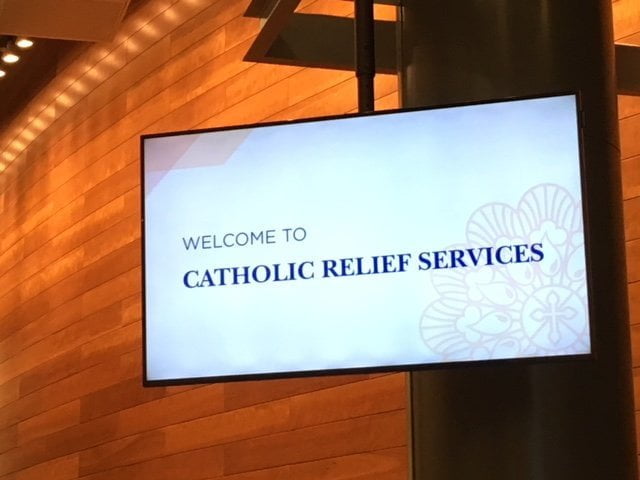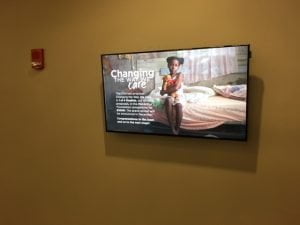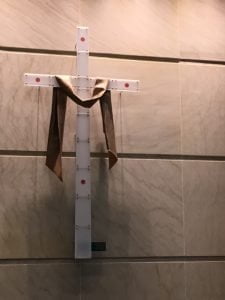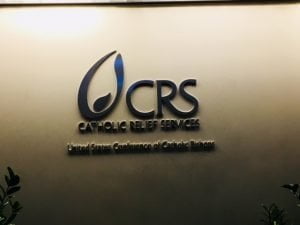Better Than Most is a regular feature of The Business of Giving, examining the best places to work among social good businesses and nonprofit organizations.

Sean: Catholic Relief Services is the international development arm and humanitarian assistance arm of the United States Catholic community. We reach out to people in over 100 countries around the world, reaching over 100 million people every year, focusing our efforts on emergency response, health interventions, agriculture, water, and economic development.
Eric: I think I have an easy specific example of a project and it was an internal podcast that the goal was to offer space to reflect on mission and to reflect on stories, and for colleagues around the world who have been here some 20 years, some just like a handful of months to just share about their stories and why they’re passionate about being here.
Stephanie: I like to talk about our culture here at CRS. Most people go to work because they have to pay their bills off. It’s like we do too notwithstanding that, but to come where what Maria does make a difference. What David does makes a difference. What Stephanie does make a difference in the lives of so many people, and they embrace that culture and that culture is embraced from the top to the bottom. It maybe something very small that you need but that small goes into making several things very good. That’s the way I see the culture here.
Maria: CRS actually has an unofficial club. It’s called the Bad Penny Club. Basically, we tend to retain our staff for a lot longer, I think, than other organizations. But people do leave but so many times when they leave, they come back. And a lot of times, what they say is, “Wow, those other places just really aren’t CRS”, and they’re realizing that it’s more than the paycheck or the better title that they experience of working here is really meaningful and the people that we work with and the mission. So, I think these “bad pennies” as we call them are people that make their way back into our building and back to CRS because the experience of working here is just unique.
David Orth-Moore: We work passionately because we believe in the mission of the agency and we’re at our best during emergencies. People are willing to work long hours because we feel like we want to give the poorest of the poor everything we have. Sometimes, our work-life balance gets out of balance in those moments but we love to do it because we know that we’re making a difference in people’s lives. And the agency is always promoting us to get back into a normal work-life balance when possible.
David Palasits: I’d like to build on what my colleagues said about how we’re trying to make sure we’re listening carefully. So, one way we’re trying to listen more carefully to employees about what they really like about CRS and what they’d like to see different in a scientific way is conducting a staff survey. We had a little selfie incentive after you finish the survey and we could say now we know broadly about the commitment of the agency in a scientific way, what people would like to see, what we can work on. So, we’re always seeking to listen even better to maintain the strong culture. What people would like is a little more support on taking risks. People would like a little more empowerment at times. But what was very transparent, the executive shared the agency-wide information, departments talked about the results. They have some action plans. So, we’re trying to apply some best practices to this good culture because we know we can improve.
 Nikki: One of the things that struck me when I was listening to my great colleagues here was this idea of humbleness and unassuming nature of CRS. I come from the media world where executives can be bombastic and puff out their chest, but I do feel like the leadership here is completely unassuming as represented by our President and CEO. This is a guy, when he took over, he didn’t want the big office that was offered to him. He actually now uses a very small office as his office because that’s just who he is and to me, that is so important, that kind of behavior, because it’s trickled down. It’s leading by example. That’s who we want to be as an agency as well.
Nikki: One of the things that struck me when I was listening to my great colleagues here was this idea of humbleness and unassuming nature of CRS. I come from the media world where executives can be bombastic and puff out their chest, but I do feel like the leadership here is completely unassuming as represented by our President and CEO. This is a guy, when he took over, he didn’t want the big office that was offered to him. He actually now uses a very small office as his office because that’s just who he is and to me, that is so important, that kind of behavior, because it’s trickled down. It’s leading by example. That’s who we want to be as an agency as well.
Larisa: Sean does a good job of helping us, especially in his emails to us, helping us realize that despite the fact that we’re in a cube, we’re contributing to the work around the world, and what we do is significant. And I think, something- I don’t know if other organizations do this but there are opportunities of [TV-wise,] temporary duties for people to go, people here or in other offices, other fields to go overseas if someone’s on maternity leave or a vacation leave or whatever, to go and spent three, four, six months in a different position. Sometimes a totally different position. And sometimes, that becomes a permanent thing.
Maria: I think CRS really is very holistic in the care that they offer to their employees. We have a gym. We have rooms for nursing mothers. We have an infirmary. We have a place to store bicycles. For commuters, we have good benefits. And so, I really think that CRS leadership understands that healthy people and happy people make good workers.
David Palasits: There’s a question you asked about equity and diversity and inclusion. And just one example. Like other organizations, one time we had a tough time after the 2008 or 2009 recession there. And we needed to cut back. And what we did cut back on some salaries and we didn’t do it across the board. What we did is those who are paid highest took the largest cut in salary. So, that was one example of how we were trying to look at equity. Fairness of approach in our internal systems when times got tough.
 Eric: I want to talk a little bit about faith. Just broadly consider it. Catholic Relief Services, it’s a faith-based organization. And in my kind of shock, we’re doing a lot of stuff with the Catholic side; how are we reaching Catholics. But I think, kind of at large, the Catholic in front of it, it’s all about giving people space for that reflection. Giving people space… people of any faith and no faith to step back and again reflect on why am I here? What am I doing? Why is this important to my personal goals, my personal beliefs about how the world works?
Eric: I want to talk a little bit about faith. Just broadly consider it. Catholic Relief Services, it’s a faith-based organization. And in my kind of shock, we’re doing a lot of stuff with the Catholic side; how are we reaching Catholics. But I think, kind of at large, the Catholic in front of it, it’s all about giving people space for that reflection. Giving people space… people of any faith and no faith to step back and again reflect on why am I here? What am I doing? Why is this important to my personal goals, my personal beliefs about how the world works?
Nikki: I wanted to make sure I mentioned the unique ability here that I’ve seen to reinvent yourself and to really even align a job to what you’re best at. And I’ve seen this through several colleagues of mine who’ve literally written their own job descriptions and I’ve never experienced out of other organizations. So, I think that’s really unique to CRS and it’s something that I really value.
Stephanie: I wanted to talk about the job… what I am saying is when you identify your own life with what you’re doing at work, it makes it easy. That’s the balance of life and work. The things I’m doing in my own life, I do here while I’m at work so that makes a big difference.
David Orth-Moore: Our performance management system, I think, is also unique. Twice during the year — minimum — you have a specified coaching session with your supervisor where you’re sitting down, not talking about the performance goals that you wrote but how do you feel in your job? What’s going well? What’s not going well? What are difficult things for you? What relationships are new for you that are helping? And then at the end of the year, we do an appraisal. You do a self-appraisal and the supervisor is doing an appraisal.
Antoine: I would say that Catholic is in our DNA and this is a core part of our identity. For me, as a Catholic, it was clear [unintelligible] that I started with Catholic Relief Services that I have the opportunity to apply Catholic society teachings in everyday work and with partners and the local church structure.
Annemarie: I always say that it is one of being a family. We care about each other and we share the mission and the values so deeply. It’s not a job. It’s more of a vocation. I think it’s partly about the kinds of people who we hire. We care about people who come into CRS who care deeply about our mission. We’re a Catholic organization. Not everybody who works for CRS is catholic but you’ve got to share those core values. And it’s in how we work. It’s what we promote in terms of our relationships with partners and someone. I always think about like how we assess the quality, our performance of staff. Yes, we want outcomes. We want results, but we also look at the relationship. So we want to be sure that they are fostering strong relationships and working in a way that is promoting those values as well.

Catholic Relief Services Staff with Denver Frederick

